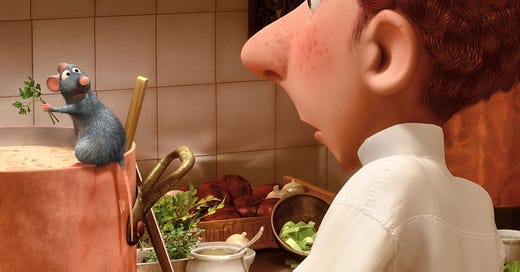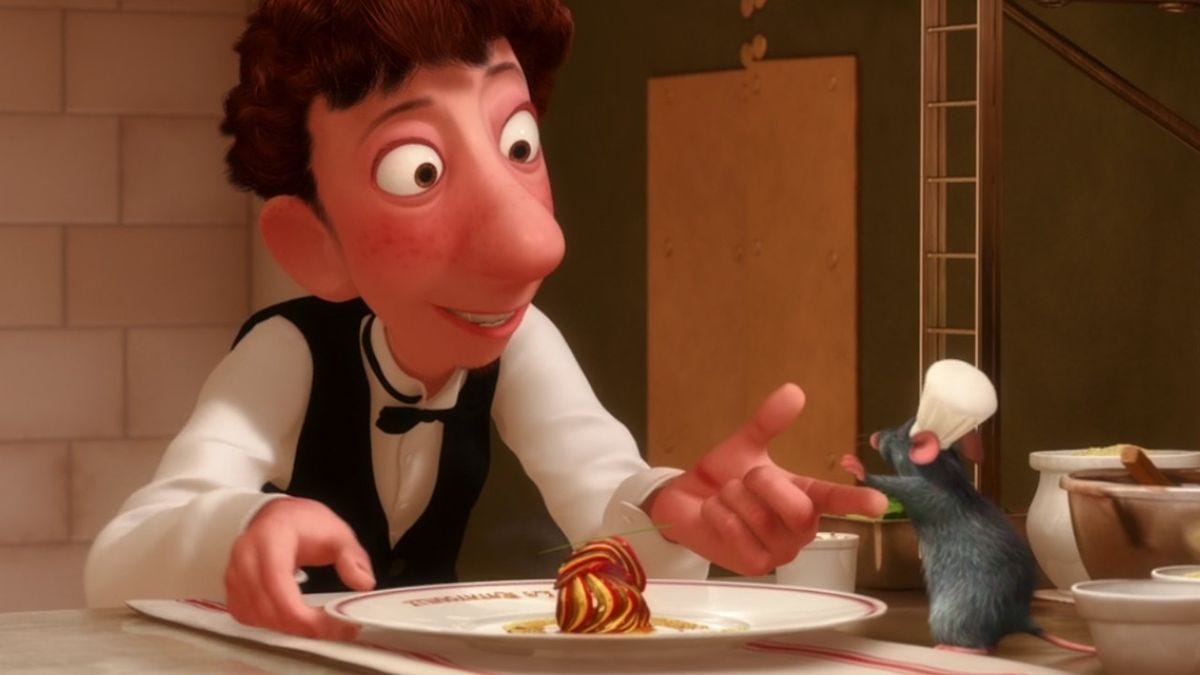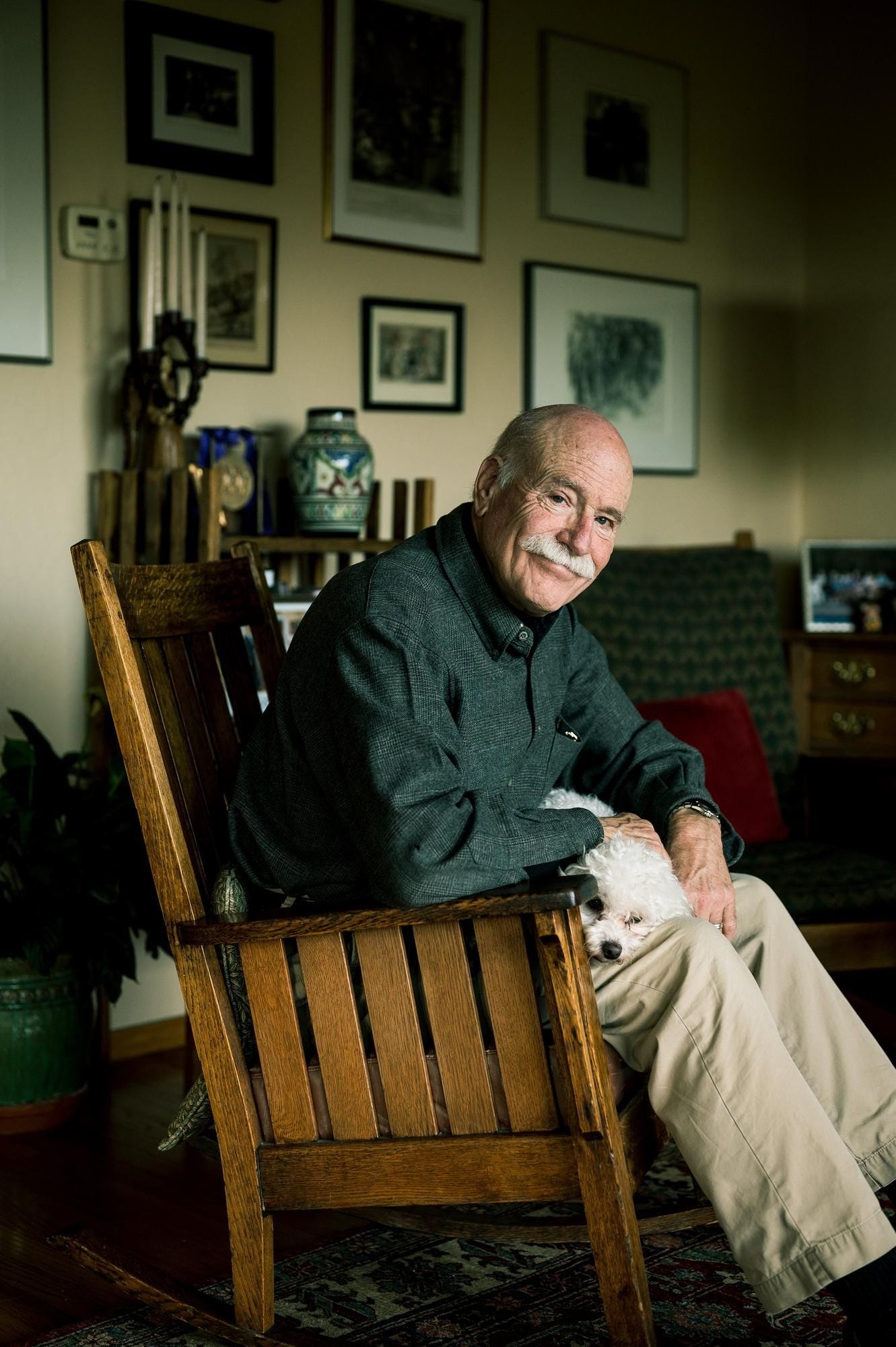Criticism is the anti-joy
Lessons from an unlikely pairing: Disney’s Ratatouille and Wolff’s “Bullet in the Brain”
My two-year-old has an obsession with mice. We don’t know why or how his love for them bloomed so fervently as we don’t like mice one bit, but his absolute delight and joy at hugging a stuffed animal mouse or seeing a cartoon mouse scurry across the screen has in turn delighted us. Recently, I remembered that there is a whole slew of mouse movies in existence and pulled up Disney’s Ratatouille for Gummy Bear to try. After I pressed play, I had to encourage him to wait—don’t worry, the mice are coming!—because the first scene is actually an interview with the imposing food critic Anton Ego.
If you haven’t seen the movie in a while, let me jog your memory: in Ratatouille we see a passionate mouse with a talent for cooking become separated from his family and find himself at his idol’s restaurant, Gusteau’s. There, he inadvertently helps a hapless chef named Linguini (I know) create a delicious soup. The two decide to pair up in order to continue making revolutionary food, with Remi the mouse controlling the human chef through practiced tugs on Linguini’s hair that he delivers while hiding beneath his chef’s toque. Soon, Gusteau’s reputation takes off once again thanks to Linguini and his “Little Chef.” One night, the doors open ominously to reveal a thin and pale man with an unimpressed look in his eye. It’s Ego, and he’s here to try Linguini’s food. Through a series of hijinks and entertaining and emotional sub-plots, it is not certain whether Remi and Linguini will be able to deliver a meal to Ego or not.
Eventually, they get back together after Remi’s family breaks him out of a rat trap sealed in the trunk of a car, and he decides to make for Anton Ego a truly surprising dish: the humble ratatouille, what one character remarks is “peasant food.” Ego takes a bite and is immediately transported through memory, shown by whooshing bursts of spinning light, to a scene from his childhood: his mother making ratatouille at their stove, Ego as a young boy with kind eyes enjoying the dish in a kitchen lit with buttery sunlight. With this bite, the Ego as of old—the one who loved food with a deep and reverent pleasure—returns to himself. Remi and Linguini end up opening their own restaurant where they serve people and rats alike, and Ego gives up his career as a critic, instead choosing to be a small-business investor (while wearing an artsy beret) and always has Remi make him his favorite dish—ratatouille—when he frequents their restaurant.
If you parent or babysit a young child who has a couple choice favorite movies, then you know that as the caretaker, you rarely watch the movie from start to finish. There are dishes to put away, grocery lists to make, a few yoga moves done here and there. On top of that, we typically watch movies in twenty to thirty minute segments. So it took me a good long while to see this movie in its entirety since I first saw it when it came out during my sophomore year in high school.
This time around, when I finally saw the last thirty minutes of the movie uninterrupted, I was moved to quick and gasping tears during the scene of Ego tasting the ratatouille and being transported to his childhood. Wait a second, I thought. I’ve felt this before. I’ve seen––no, read––this before. I wiped my tears and was transported myself, to a stone room with wooden tables pushed together making a large rectangle. I sat alongside my fellow students with my notebook and pen at the ready, a photocopy of Tobias Wolff’s “Bullet in the Brain” before me.
My teacher, a visiting professor of creative writing who only stayed two years before leaving to continue writing novels and comics full time, read the story aloud in his deep, imposing voice. He read slowly, expressively, and I felt the story unfurl there in the room, rolling out in ways I didn’t expect, and I was utterly transfixed at what writing could do. At the moves a writer could make with words, the risks taken with structure and subject. When our teacher finished reading, I tried to press the tears back into my eyes with my mind. My chest went all buzzy and glowy. I felt slightly drunk. I’d already known it, but again, my deepest self rang out its message: Words. Your life is meant for words.
If you haven’t yet read this story, please, set aside twenty minutes for yourself and read it. In short, it is the story of Anders, a literary critic who finds himself in the middle of a bank heist. As the robbers point their guns and shout lines that sound straight out of a B-rate movie, Anders can’t help it: he titters, he laughs. So trained is he to recognize the cliché, to eviscerate the choices made by others in the name of critique, that he fails to hold himself together and recognize a moment for what it is even when, yes, a gun is pointed at his head. After a quick back and forth between the robber and Anders, the robber wants to make sure Anders understands what is at stake. Anders better stop fucking with him, or he’s history––Capiche? “Capiche?” Anders parrots. He bursts out laughing, and the robber shoots him in the head.
It is here that Wolff slows down time in a masterful, heart-quickening way. Our teacher told us that Wolff had heard someone tell him that no one could ever pull off a “life flashing before your eyes story” and Wolff decided to rise to that challenge. As the bullet moves through Anders’s brain, Wolff shows us all of the memories that did not flash before his eyes, memories that illuminate for the reader the kind of life Anders has had, the kind of person he has grown to be after years of slow-growing bitterness and failure. We are also privy to a number of memories searing in their beauty, memories that make us wonder: What happened to Anders to make him the way he is now, at the end of his life?
Finally, we get the one memory that Anders gets to see before his life flickers out. Tobias writes: “This is what he remembered. Heat. A baseball field.” And it is at this point that, already, I begin to cry, no matter how many times I’ve read this story. Wolff weaves for us in three paragraphs the moment that Anders first fell in love with language, all because of a young boy visiting from the south who speaks in a way that, while grammatically incorrect, is perfect in its rhythm and its simple beauty. We have zoomed back to the first point on the graph that is Anders’s relationship with words and with art, and it is beautiful. We mourn, not just for Anders’s life, but for the life that he himself lost in any number of ways, but chief among them, is his choice to critique writing instead of relish in it, flaws and all.
In an interview in Fiction Writers Review, Wolff said this of the story and of writers:
“I’m sure some critics maybe thought I had them in mind. But actually the horrible truth is that I was mining some of my own tendencies to be derisory of things that I'd read or hear. It's a faculty that most writers have-they're very attentive to the way other people use language. And often I think that I would, without meaning to, have a kind of inward sneer. And to live that way detaches you from reality, and that's what happens to Anders in the story. The gun isn't even real to him-it tickles like a finger. His critical faculties have so overwhelmed him that he's completely detached from reality at the end.”
In other interviews, Wolff discusses his thoughts on writers and why and how we do what we do. At one point he says that there is very little money to be made from writing short stories these days, and that there are fewer places to publish the short stories we write. So why do people continue to pour themselves into this art form? “We do it because we have to, because something compels us,” he said.
Recently, discourse on Substack alerted me to the publication of an eviscerating review making the rounds. Novelist Brandon Taylor unflinchingly took down Rachel Kushner’s newest book, Creation Lake, which was shortlisted for the Booker Prize. I don’t have a horse in this race. I don’t personally know either writer and they certainly don’t know me. I have not read the book in question, but I loved some of Kushner’s earlier works, and I was curious to read a review that had some people gleefully scandalized and others quite upset. I clicked a link and, truthfully, couldn’t believe my eyes. What a take down. I couldn’t and wouldn’t read the entire thing—I only scanned it, so cruel it seemed to me. At one point, Taylor point blank questioned why Kushner even wrote the book, which, coming from a fellow writer, seems especially harsh.
So here I am, critiquing the critic, but I clicked away from that review and was left wondering: Why? What was the point of being so cruel to another writer? It’s one thing to not like or understand a book, but it’s another to shred it so brazenly in such a public way. What did Taylor possibly get out of writing this mean-spirited review other than clicks and attention? Believe me, I know the purpose of a critique—I got my MFA, too, and my first book went through many rigorous rounds of edits. But the older I get, the more I realize that editing is different from critique and most criticisms are not helpful.
In grad school, I turned in an essay that I had worked over, cried over—the lived experience in that essay was important to me. A woman in my class handed me her comments on her way out the door. She had written something to the effect that she didn’t see the main point I was arguing, and that if I couldn’t articulate that, everything else I wrote was unearned and unfulfilling. Ten years later, I can better understand that she was trying to help me, and technically, she was right. But there was a beating heart in that essay, a messy one that needed a lot of fixing, sure, but something true and honest that was asking to be heard, maybe not understood, not yet, but heard.
And in the moment, I went home and I cried. I built the walls up around my heart and around my writing. I started steeling myself anytime I had workshops and began keeping a six-pack in the fridge for when I got home. Did her comment help me with the essay? No. I never revised that essay. It is still unwritten.
I think of another quote by Tobias Wolff, this one in The Paris Review:
“I have also learned that you can be patient and diligent and sometimes it just doesn't strike sparks. After a while you begin to understand that writing well is not a promised reward for being virtuous. No, every time you do it you're stepping off into darkness and hoping for some light. You can be faithful, work hard, not waste your talents in drink, and still not have it happen. That's what makes writers nervous—the sense of the thing being given, day by day.”
Wolff’s almost mystical reverence for writing speaks to me. When I am working on a project, I feel connected to something bigger than myself. When I am writing—no matter how it turns out in the end—it is the closest to god I’ve ever felt. Creation is a sacred act. And, while I fundamentally understand the worth of reviews and critiques, especially in a world flooded with so much—too much—media and AI-generated garbage at that—I have been learning that I don’t want to foremost be a critic—in any realm I’m in. There are other, more positive and fruitful ways for me to engage.
As an artist and teacher, I want to build others up. I want to encourage people to follow their instincts and their bliss—what they are writing is something I could never write, so how could I overstep into the miraculous bounds of their particular imagination and skillset to impose my own? It just doesn’t fit. As a teacher, this looks like asking questions before lecturing, listening before I speak, and finding multiple examples of techniques to ensure that more voices are heard than just my own.
And as a parent, this looks like dropping judgement and letting others’ judgements roll off my back. It’s trying new things and clueing in to what my child needs over how I appear as a parent to others. Each child, like each work of art, is completely different from the next. There is no prescriptive one-size-fits-all approach to parenting, to art-making, to decision-making, to life. Infinite options exist in all realms. Who am I to speak out and say what is right or wrong or working or not working for someone else?
When I find myself nitpicking or complaining or comparing my virtues to others’, I leave the conversation feeling barbed on the outside and hollow on the inside. I don’t want to feel that way. I don’t want to be that person. I want to be warm and sunny, welcoming and safe. I want to be loving. I want to love. Unlike Anders at the end of his life in “Bullet,” I want to relish in the quirks and surprises of language, of structure, of life. Like Ego, I want to don a beret and enjoy each bite of the dish—whatever it is—before me. Because it’s a miracle that we’re even here. It’s a miracle that we are surrounded by art and food and other people who are guided by their own particular passions and life questions. Why waste time chopping things down when we could, instead, be planting our own seeds and gazing at the beautiful flowers and trees planted by our neighbors? Friends, let us delight. We are here for such a short time. Why not find every bit of joy we can and relish in it?
A few books, shows, and movies that bring joy:
The Book of Delights by Ross Gay
World of Wonders by Aimee Nezhukumatathil
Love Nina by Nina Stibbe
Anne of Green Gables by L.M. Montgomery
Hometown Cha-Cha-Cha on Netflix
Little Women (book or either movie version)
Bluey
The True Love Experiment by Christina Lauren
Cooking for Jeffrey by Ina Garten
Red, White, and Royal Blue by Casey McQuiston
Finding Freedom by Erin French
Heartburn by Nora Ephron (audiobook version narrated by Meryl Streep)
Mother Bruce by Ryan T. Higgins
Ratatouille
Cars 1 and Cars 3 (not Cars 2)
Queer Eye
English Teacher on Hulu
Thank you so much for reading With Love From My Kitchen Table. The ideas in this essay have been turning over in my mind for a few weeks now, and I’d love to hear your thoughts. Sound off in the comments! In particular, I’d love to know what stories never fail to make you cry and what unexpected lessons you’ve learned from engaging with art.
I want to give you a head’s up that I will be making a few changes around here at With Love From My Kitchen Table. I’m hard at work on my novel and I start teaching my new class The Mother Writer in two weeks! Instead of publishing my Substack weekly, I am going to try putting out one free and one paid piece per month for a while and see how it goes. Paid subscribers get access to everything. There may be more essays if I have the bandwidth, but I’m working hard to prioritize my writing projects in a way that makes sense for my schedule at this time. Thanks so much to all of my free and paid subscribers—I am so happy you’re here!
I hope you’re doing well and that you find joy every place you look!
With love from my kitchen table,
Kaia







Kaia, your words are an inspiration! I love you!
I decided I HAD to read Creation Lake when I saw Brandon Taylor tweet something like, “I think this book gave my Lyme disease”. Sometimes critique definitely crosses into plain meanness!
As far as mouse movies go— my siblings and I loved The Rescuers!